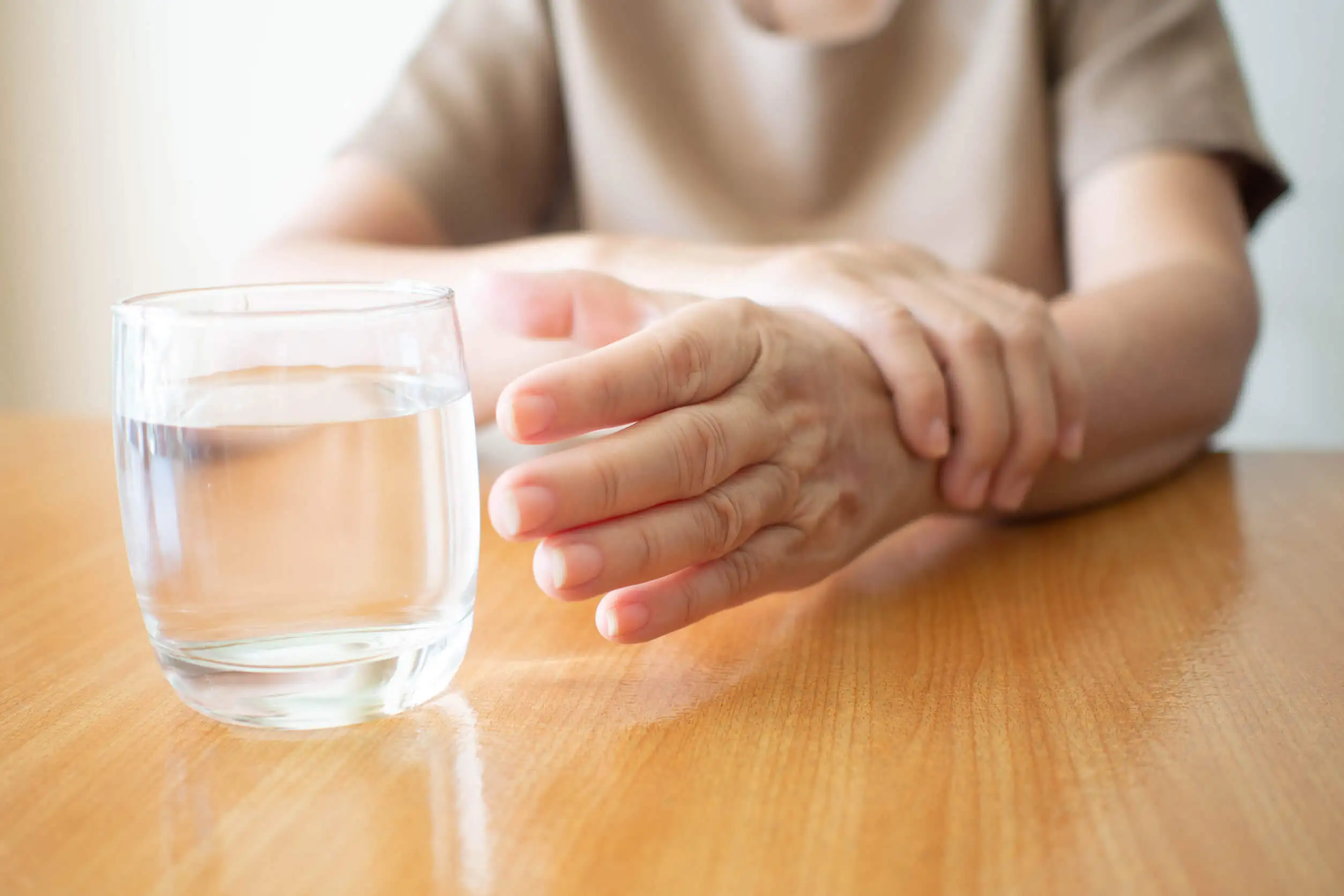Akathisia: Symptoms, Causes, Treatments and More


Reviewed and approved by the nurse Leidy Mora Molina
Akathisia is a syndrome that causes an uncontrollable need to move. Affected persons only find some relief if they’re in continuous movement. If they remain still, they experience profound discomfort.
Most commonly, it’s a side effect of certain types of medication, particularly antipsychotic medications. It’s estimated that up to one-third of people who take such drugs regularly have the syndrome.
Akathisia is believed to be underdiagnosed, as the symptoms are often overlooked. This leads to the drug causing the reaction not to be withdrawn.
What is akathisia?
Akathisia is defined as a movement disorder characterized by great difficulty in remaining still, accompanied by a subjective feeling of restlessness. If the person does not move, he or she experiences distress or an itching sensation, for example.
This syndrome affects the quality of life in a noticeable way. It has even been associated with aggressive behavior and even with an increased risk of suicide.
In older adults, it’s a risk factor for falls. It’s estimated that akathisia is present in 20-75% of people taking antipsychotic medications.
Depending on when the condition occurs, it can be of different types:
- Acute: This arises shortly after starting a medication and lasts less than six months.
- Chronic: This takes place when it lasts more than six months.
- Late: This appears months or years after starting to take the drug in question.
- Withdrawal: This occurs during the six weeks after stopping a drug.
Akathisia is sometimes confused with another disorder called tardive dyskinesia. The latter is also a side effect of antipsychotic medications.
The difference between one and the other is that in dyskinesia, the person isn’t aware that he or she is moving. With akathisia, however, the person is aware of the movement.

Symptoms and diagnosis
The main symptom of akathisia is the desire for constant movement and the inability to sit still. This affects the trunk, hands, arms, and legs; especially the latter. For this reason, it’s sometimes confused with restless legs syndrome.
Other symptoms include the following:
- Nausea
- Aggressiveness and agitation
- Depression and anxiety
- Sleeping difficulties
- A feeling of restlessness and mental discomfort
- Loss of appetite and sometimes weight loss
- In severe cases, suicidal thoughts or behavior
- Performance of repetitive movements (it can be rocking, shuffling, or swinging)
We think you may be interested in reading this, too: 5 Keys to Calming a Restless Mind and Finding Internal Peace
The diagnosis is made based on the medical history and a physical examination. The health care provider will ask about any drugs the person is taking.
The health care provider will look at the person’s movements and reactions to sitting still. They may also use an assessment tool called a Barnes rating scale for akathisia.
In some cases, additional tests are done to rule out similar problems:
- Mania
- Psychosis
- Tardive dyskinesia
- Agitated depression
- Anxiety or insomnia
- Abstinence from drugs
- Restless legs syndrome
- Attention deficit hyperactivity disorder (ADHD)
Like this article? You may also like to read: Panic Attack vs. Anxiety Attack: Are They the Same Thing?
The causes and risk factors for akathisia
Akathisia is more prevalent in people taking first-generation antipsychotic medications. These types of medications are the oldest and include drugs such as chlorpromazine, haloperidol, and Loxitane ®.
Antidepressants and antiemetics can also cause akathisia.
This effect has also been detected, although to a lesser degree, in second-generation antipsychotics and even in newer antipsychotics. Science has not pinpointed the reason why this occurs. It’s thought that it may be because these drugs block dopamine receptors, a neurotransmitter that affects movement.
However, it’s also suspected that other neurotransmitters, such as serotonin, acetylcholine, and GABA are involved in akathisia. This side effect also occurs in people taking other medications:
- Sedatives
- Antivertiginants
- Calcium channel blockers
- Selective serotonin reuptake inhibitors (SSRIs)
This condition is more likely in people who receive high doses of the drug, who increase doses very quickly, or are middle-aged or older adults. There are other medical conditions that can cause this disorder, such as Parkinson’s disease, encephalitis, and traumatic brain injury.

Treatment for akathisia
The first treatment option for akathisia is to reduce the dose of the drug that causes the disorder. This is most effective in mild cases, but may take some time to improve.
If the drug can’t be reduced, it’s best to switch to another drug that doesn’t produce this side effect.
If the case is more severe, it may be necessary to introduce a specific medication to treat akathisia. However, this may carry the risk of polypharmacy. When opting for this alternative, beta-blockers, benzodiazepines, or some antidepressants are usually used.
People with this disorder often benefit from increasing their intake of vitamin B6, which is found in foods such as meat, fish, nuts, and vegetables. It’s also recommended that they do physical exercise to reduce stress.
Some additional tips
It is very important that if a person notices symptoms of akathisia, they consult their doctor as soon as possible. This is more important if there are symptoms of depression or suicidal thoughts.
Likewise, there are some measures that can be taken to control and reduce the effects:
- Prevent depression and anxiety: Psychotherapy, regular physical activity, hobbies, reducing sugar intake, adequate rest, a healthy diet rich in omega-3, and support groups are helpful.
- Practice stress management: This includes measures such as getting enough sleep, taking soothing herbal teas, planning activities, and practicing meditation techniques.
- Supplementation: It may be a good idea to introduce a vitamin B6 or magnesium supplement.
Akathisia is a reversible disorder. However, the main problem is that many of those affected by it don’t report symptoms to the physician.
The prognosis is much better when treatment is started early. It should be noted that severe, untreated cases can lead to very serious complications, such as paralysis.
All cited sources were thoroughly reviewed by our team to ensure their quality, reliability, currency, and validity. The bibliography of this article was considered reliable and of academic or scientific accuracy.
- Escobar-Córdoba, F., Álvarez-Vanegas, C., & Torres-Espinosa, L. (2015). Farmacoterapia de la acatisia aguda inducida por neurolépticos. Acta Neurol Colomb, 31(4), 447-453.
- Caqueo-Urízar, A., Urzúa, A., & Rus-Calafell, M. (2017). Efectos secundarios de la medicación antipsicótica y calidad de vida en pacientes con esquizofrenia latinoamericanos. Terapia psicológica, 35(1), 111-114.
- Martínez-Aguayo, J. C., Silva, H., Arancibia, M., Angulo, C., & Madrid, E. (2016). Antipsicóticos y suicidio. Revista chilena de neuro-psiquiatría, 54(2), 141-150.
- Molero-Mateo, P., & Molina-Rueda, F. (2022). Tratamiento fisioterápico del paciente con trastorno del movimiento funcional: una revisión sistemática. Neurología.
- Gómez, M. A., & Rivas, S. A. (2014). La acatisia: algo más que un trastorno del movimiento. Revista española de trastornos del movimiento, 6(2), 6-9.
This text is provided for informational purposes only and does not replace consultation with a professional. If in doubt, consult your specialist.








